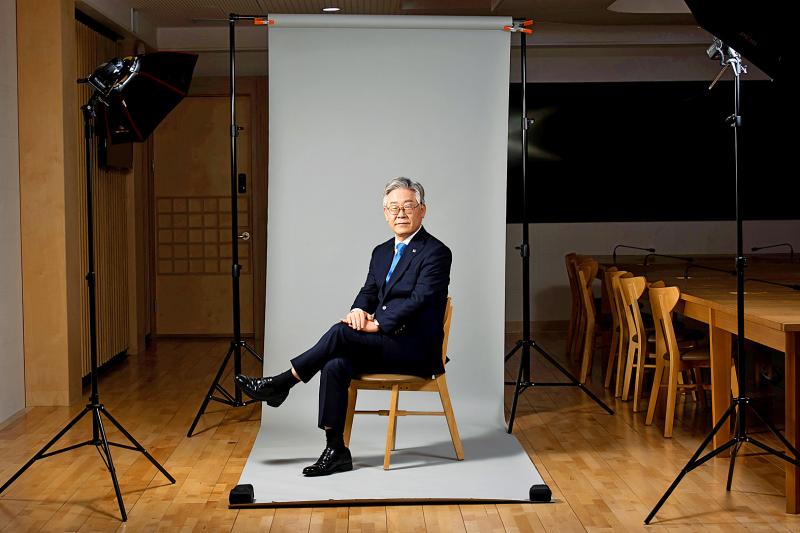Record government spending triggered by COVID-19 in South Korea has helped send a maverick regional governor to the top of polls to be the next president and fueled his push to make the country Asia’s first to introduce universal basic income.
Gyeonggi Governor Lee Jae-myung, who has served as governor of South Korea’s most populous province since 2018, warns that without across-the-board income support to address inequality, the stability of the country’s economy could be threatened.
“The capitalist system could fall apart if consumption and demand aren’t supported,” Lee, 56, said in an interview last week.

Photo: Bloomberg
His move early in the pandemic to provide handouts to boost the regional economy surrounding Seoul helped prod the central government to take action at the national level.
Lee’s call for the introduction of a universal basic income might also be followed by other politicians with an eye on the presidency, potentially extending the era of expansionary fiscal policy long after the virus is gone.
Lee, who grew up in poverty, said he firmly believes growing income disparity would make markets unsustainable, and universal basic income would “fix and further develop” capitalism.
“Massive fiscal spending in Korea is certainly helping his popularity,” said Rory Green, an economist with research firm TS Lombard. “The weaker the rebound, the more untenable a fiscally conservative political stance becomes.”
The race is tight. A KStat Research survey last week showed 26 percent of respondents preferred Lee as the next president, just three years after he ran unsuccessfully against now South Korean President Moon Jae-in in the Democratic Party primaries.
The poll showed Lee came in 5 percentage points better than party leader Lee Nak-yon, who once served as Moon’s prime minister.
Moon’s single, five-year term ends in 2022.
However, in another survey by Korea Research International released on Saturday, the former prime minister took the lead with 26 percent of favorability rating, about 3 percentage points higher than the governor.
“I have confidence in my understanding of how society and the global economy work, and how their problems can be fixed.” Lee Jae-myung said. “I’m not going to compromise.”
While Moon initially made efforts to raise the minimum wage, the country’s income inequality still remains among the developed world’s highest, according to Organisation for Economic Co-operation and Development data.
Lee Jae-myung said far more needs to be done.
South Korea should start with an annual basic income of about 500,000 won (US$430) and gradually move toward a monthly handout that is as big over the course of 10 to 15 years, he said.
A Realmeter poll in June showed that 49 percent of South Koreans approved of the idea of universal basic income while 43 percent opposed it.
Still, the call for a universal income is not limited to the governor or other progressives in Moon’s camp. The idea is also gaining support in the top opposition conservative group.
The newly named People Power Party recently introduced a pledge to seek a basic income.
Its interim party leader, Kim Chong-in, is trying to build support by embracing some of the popular economic policies of the left with a tough stand on security that has been a key position of the right.

Thousands gathered across New Zealand yesterday to celebrate the signing of the country’s founding document and some called for an end to government policies that critics say erode the rights promised to the indigenous Maori population. As the sun rose on the dawn service at Waitangi where the Treaty of Waitangi was first signed between the British Crown and Maori chiefs in 1840, some community leaders called on the government to honor promises made 185 years ago. The call was repeated at peaceful rallies that drew several hundred people later in the day. “This government is attacking tangata whenua [indigenous people] on all

RIGHTS FEARS: A protester said Beijing would use the embassy to catch and send Hong Kongers to China, while a lawmaker said Chinese agents had threatened Britons Hundreds of demonstrators on Saturday protested at a site earmarked for Beijing’s controversial new embassy in London over human rights and security concerns. The new embassy — if approved by the British government — would be the “biggest Chinese embassy in Europe,” one lawmaker said earlier. Protester Iona Boswell, a 40-year-old social worker, said there was “no need for a mega embassy here” and that she believed it would be used to facilitate the “harassment of dissidents.” China has for several years been trying to relocate its embassy, currently in the British capital’s upmarket Marylebone district, to the sprawling historic site in the

‘IMPOSSIBLE’: The authors of the study, which was published in an environment journal, said that the findings appeared grim, but that honesty is necessary for change Holding long-term global warming to 2°C — the fallback target of the Paris climate accord — is now “impossible,” according to a new analysis published by leading scientists. Led by renowned climatologist James Hansen, the paper appears in the journal Environment: Science and Policy for Sustainable Development and concludes that Earth’s climate is more sensitive to rising greenhouse gas emissions than previously thought. Compounding the crisis, Hansen and colleagues argued, is a recent decline in sunlight-blocking aerosol pollution from the shipping industry, which had been mitigating some of the warming. An ambitious climate change scenario outlined by the UN’s climate

BACK TO BATTLE: North Korean soldiers have returned to the front lines in Russia’s Kursk region after earlier reports that Moscow had withdrawn them following heavy losses Ukrainian President Volodymyr Zelenskiy on Friday pored over a once-classified map of vast deposits of rare earths and other critical minerals as part of a push to appeal to US President Donald Trump’s penchant for a deal. The US president, whose administration is pressing for a rapid end to Ukraine’s war with Russia, on Monday said he wanted Ukraine to supply the US with rare earths and other minerals in return for financially supporting its war effort. “If we are talking about a deal, then let’s do a deal, we are only for it,” Zelenskiy said, emphasizing Ukraine’s need for security guarantees